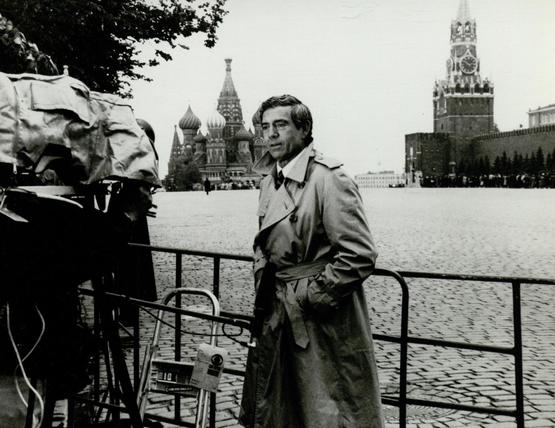As changes swept across the Soviet Union in the late 1980's, Mikhail Gorbachev encouraged a policy of glasnost—openness and transparency. This applied to Western media, who were eager to film in the country. In this CBS News Special, Ed Bradley, Diane Sawyer, Wyatt Andrews, Tom Fenton, Bernard Goldberg, Bruce Morton, Dan Rather, Bob Simon, and Lesley Stahl reported from inside the newly opened Soviet Union. Between May 20 and 26, 1987, they visited five different cities, including Moscow, Leningrad (Saint Petersburg), Volgograd, Vilnius, and Tallinn. They talked to journalists and military personnel, farm and steel workers, doctors and artists, and were granted a first-ever look inside the Soviet Politburo and inside a Soviet warship. We see a criminal trial in Moscow, a drug bust in Georgia, the birth of a baby in a hospital, Russian children both repulsed and fascinated by American culture, and black marketers arguing. Ed Bradley talked to Soviet spokesman Genadi Gerasimov and Diane Sawyer interviewed Boris Yeltsin. Produced by Lane Venardos with David Buksbaum as vice president for special events, the two-hour special aired on June 24, 1987.
The show received good reviews although some complained about its lack of depth. The Los Angeles Times, for example, wrote that the show "does a solid job of depicting the tensions that accompany sudden change," but does not provide adequate answers so the big questions and the Chicago Tribune called it "ambitious, frequently sketchy, but consistently interesting." Although Variety remarked on the lack of cohesiveness of the show, it praised how "CBS still does these so-called 'instant documentaries' better than anyone else, and the segments are short enough that the broadcast remains riveting to the end." In a similar fashion, Tom Shales in the Washington Post called the show "too often diffuse and cluttered" but concluded that "even so, the program is absolutely worthwhile as a viewing adventure—an eye-opener and a must see, however flawed the execution."
In a 2015 interview, producer David Buksbaum, who had filmed in Russia in the 1970s under much greater difficulties, recalls going all over the country to document the changes.


